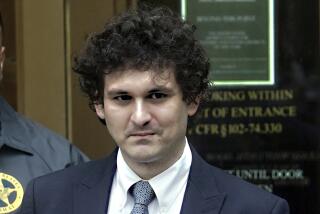Minkow Addicted to Money, Defense Lawyer Tells Court
- Share via
Barry Minkow was a “compulsive debtor” who had an uncontrollable need for millions of dollars the way a drug addict needs a fix, his defense lawyer said Friday.
In a report filed for his sentencing Monday on 57 fraud counts stemming from the 1987 collapse of his ZZZZ Best carpet-cleaning company, lawyers for Minkow recanted the young entrepreneur’s defense that the mob forced him into committing the fraud and said Minkow was the victim of an unhappy childhood.
“The true story of ZZZZ Best is of a young man almost constantly in debt, struggling to prove that he will not become the failure depicted by his father,” attorney David E. Kenner said in his report.
“In Barry Minkow’s case, the hoped for ‘Big Fix’ was the infusion of new funds--funds that he could only obtain through activities that caused his prosecution. Consequently, the appropriate way to see the defendant is as someone akin to . . . a drug addict, chronic alcoholic, compulsive gambler or over-eater. Each is a form of compulsive, addictive behavior, against which the person has lost control.”
Stiff Sentence Sought
Prosecutors in their own sentencing report called Minkow “one of the most significant white-collar criminals ever prosecuted on the West Coast” and said they will seek a sentence of at least 25 years in prison and $26 million in restitution.
“During his five-year crime wave . . . Minkow carried out what, in effect, amounted to a search-and-destroy mission aimed at the trust and integrity of our financial institutions, securities markets and the public at large,” prosecutors James R. Asperger and Gordon A. Greenberg said in their report.
The defense report recommended a sentence of from eight to 10 years and psychological counseling.
U.S. District Judge Dickran Tevrizian, who will sentence Minkow, has already imposed prison sentences ranging from a month to eight years for the other 10 defendants in the case.
Mafia Claim
Minkow, 23, was the only one who went to trial, contending throughout that he was forced into fraudulently obtaining millions of dollars from banks and private investors for ZZZZ Best by a series of organized-crime figures who had infiltrated the company. Testimony in the case showed that the company’s books were padded by listing millions of dollars in revenue from insurance restoration jobs--supposedly repairing fire and flood damage to high-rise buildings--that were entirely fabricated.
Kenner said in an interview Friday that Minkow still alleges that a variety of reputed Mafia figures helped him set up the fraud and, at least at first, caused the young businessman to worry about not paying back his debts to them.
But Minkow “is aware that the events that he experienced in connection with ZZZZ Best do not necessarily amount to the legal defense of duress,” Kenner said.
“A better explanation” for the role the mob figures played, however, is “probably . . . a carrot-and-stick approach,” Kenner said.
“I think probably Barry enjoyed the money, enjoyed the publicity, and I think that it became very easy for Barry to rationalize the life style and to continue to do what he was doing,” he said.
In his report, Kenner portrayed Minkow as the victim of a troubled childhood. Minkow was continually berated by his father for his lack of athletic ability and often played with his sisters’ friends, because he had no playmates his own age, the report said.
His hyperactivity caused him problems in school, where Minkow had “an uncontrollable need” to be the center of attention, according to a psychologist’s evaluation quoted in the defense report.
“He learned how to lie in the fifth through eighth grades when his father insisted that no tales be told out of the house about his mother’s disturbances, his father’s unemployment or why the gas (at his home) was turned off” when the family could not pay the bill, psychologist Paula Smith-Marder wrote.
As a teen-ager, the defense said, Minkow loaned others money at usurious interest rates, passed bad checks and later fell under the influence in his business of reputed organized-crime figures, such as the late Jack Catain and “stock fraud artist” Maurice Rind, who has been named by authorities as a suspect in the ZZZZ Best case but has not been charged.
“In this atmosphere, it is difficult not to discern that Minkow was subject to some form of intimidation, if not direct threats on his life,” Kenner wrote.
But the prosecution said Minkow’s lies about Mafia manipulation during his nearly two weeks of testimony “are unparalleled in this courthouse.”
“Now that it is in his self-interest (after the jury expressed its total disbelief in his story) . . . Minkow conveniently admits in his pre-sentence report that he ‘lied under oath during his trial.’ He attempts to excuse these lies by claiming that this was ‘the old Barry,’ who needs constant approval and attention from others,” the prosecution said, quoting from a U.S. Probation Department evaluation of Minkow.
“We believe that. . . Minkow’s newly discovered remorse and religion should be viewed with a strong and healthy sense of skepticism,” prosecutors said.
More to Read
Sign up for Essential California
The most important California stories and recommendations in your inbox every morning.
You may occasionally receive promotional content from the Los Angeles Times.













